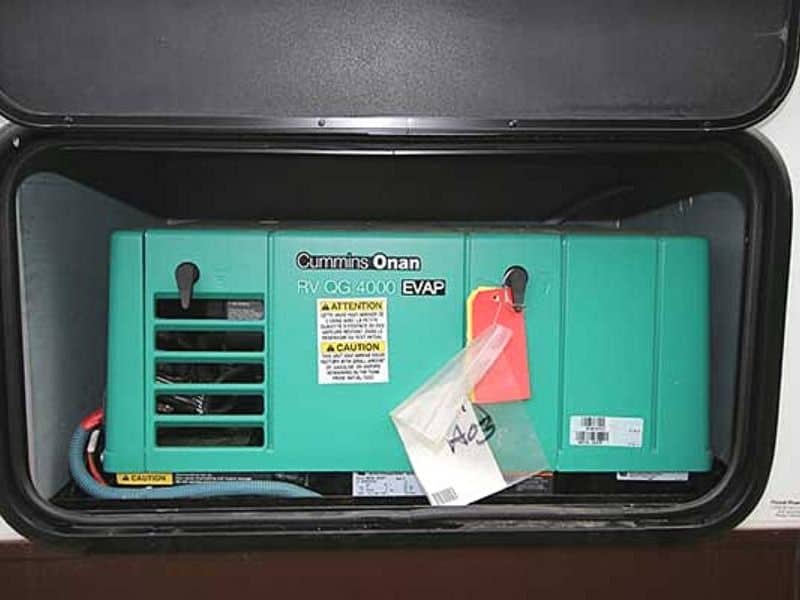Most modern travel trailers have complete electrical and plumbing systems and just about every comfort and convenience feature you can think of, ranging from king beds to full dry baths.
When it comes to RV generators though, the answer is not so clear, which is why RVers often wonder whether travel trailers have generators.
The answer is that most travel trailers do not come with built-in generators, however, there are a few exceptions to this rule, as you’ll see later.
Key Takeaways:
- Most travel trailers are not equipped with a generator.
- Some luxury travel trailers or those specially designed for off-grid camping can come with a built-in generator.
- Portable generators can be used with travel trailers that do not offer a built-in generator.
Travel Trailers & Generators
Although most travel trailers do not come with a generator, there are some exceptions.
Generally, campers are designed to run on campsite or shore power, but a portable generator can be used when shore power is not available.
This allows RVers to maintain power for essential appliances and devices while camping in remote locations without electrical hookups for extended periods of time.
Built-in Generators
Although most travel trailers do not come with built-in generators, some higher-end models do include them.
These luxury trailers often come equipped with generators seamlessly integrated into their design.
This built-in feature offers a level of convenience and ease of use that’s hard to beat, as you don’t have to worry about setting up a portable unit every time you park or need off-grid power.
Because with just the flip of a switch, you have immediate access to power for all your needs – from air conditioning to kitchen appliances.
But it’s not just about convenience. Built-in generators in these premium travel trailers are typically designed to be more efficient and quieter than their portable counterparts.
As they’re often better insulated for noise reduction and are strategically placed to minimize vibration and exhaust issues.
Plus, they’re usually connected to the trailer’s fuel supply, which means you won’t have to carry extra fuel cans.
Portable Generators
Because most travel trailers don’t offer a built-in generator, many travel trailer owners choose to use portable generators for their power needs.
Portable generators offer flexibility and can be easily transported when not in use.
When selecting a portable generator, it’s important to consider factors such as output wattage, fuel type, and noise level.
Additionally, it’s crucial to follow proper safety guidelines and maintenance procedures to ensure the safe and efficient operation of the generator.
Which Travel Trailers Have Built-In Generators?
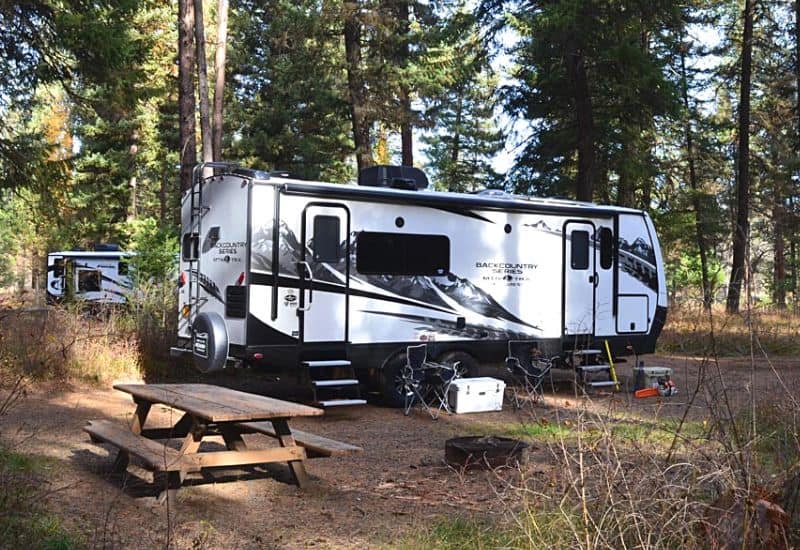
Now that we’ve established that most travel trailers don’t offer a generator, you might be wondering, which ones do.
Especially if you’re in the market for a new trailer or considering an upgrade.
While built-in generators are more common in luxury models, there are a variety of options across different brands and price ranges.
So let’s take a look at the most popular travel trailers that have built-in generators.
Travel Trailers With Generators
- Outdoors RV Backcountry Series: Standard Cummins Onan 3.6K On-Board Propane Generator
- Northwood Arctic Fox North Fork: Optional Built-in 3.6 Onan Propane Generator
- Northwood Nash 17K: Generator Ready With Optional 2.5 Onan Propane Generator.
- Living Vehicle HD24: Optional Backup Generator (6.5KW Cummins 240V Propane Generator)
- Bigfoot 2500 Series: Optional Cummins 2.5 KW Propane Generator
- Forest River XLR Boost: (Toy Hauler) Includes Yamaha 4.5 or 5.5 Generator
- Forest River Sandstorm: (Toy Hauler) Optional 4.5 NPS generator
- Keystone Fuzion Impact Edition: (Toy Hauler) Offers Optional Onan 4,000 Watt Gasoline Generator.
- KZ Sportster: (Toy Hauler) Optional 4.0 or 5.0 Onboard Generator
- Forest River Stealth: (Toy Hauler) Optional 4.5 NPS Generator
- Forest River XLR Hyperlite Camper: (Toy Hauler) Optional Yamaha 5.5 Generator
Why Do Travel Trailers Not Have Generators?
Travel trailers often do not come with built-in generators for several reasons, which we’ve outlined below:
- Affordability: Including a built-in generator can significantly increase the cost of a travel trailer. Because of this, RV manufacturers often exclude them to keep the base price more affordable for a broader range of customers.
- Weight and Space: Generators are heavy and take up space. Travel trailers are designed to be lightweight and space-efficient. Adding a generator would increase the weight, potentially making the trailer more difficult to tow for vehicles with lower towing capacities. It also takes up valuable space that could be used for storage or other amenities.
- User Needs: Not all RVers need or want a generator. Some prefer to camp in campgrounds with electrical hookups, while others might opt for solar panels or alternative power sources. RV manufacturers often leave the choice of a generator to the consumer to customize based on their specific needs and wants.
- Noise and Maintenance: Built-in generators require maintenance, and they can be noisy when in operation. By not including a generator, manufacturers leave it up to the owner to decide if they’re willing to deal with the noise and maintenance responsibilities.
- Fuel Storage and Safety: Storing fuel for generators poses safety risks and requires careful design to prevent fire hazards or fuel leaks.
- Environmental Concerns: More environmentally conscious consumers may prefer options that are more eco-friendly than traditional generators, such as solar power and battery setups.
Can Built-in Generators Be Installed in a Travel Trailer?
Yes, built-in generators can be installed in a travel trailer, but there are several important factors to consider before undertaking such a project.
First and foremost, you need to account for space and weight constraints.
Travel trailers have limited space, so it’s important to find a spot for the generator that doesn’t compromise the balance and weight distribution of the trailer.
Choosing the right type of generator is also very important.
RV-specific generators are typically more suitable, as they’re designed to be compact and operate more quietly than portable ones.
Safety should also be a paramount concern when installing a built-in generator, as proper ventilation and exhaust systems are essential.
Generators produce carbon monoxide, a dangerous gas, so they must be installed in a way that directs exhaust safely outside the trailer.
In addition, adequate airflow is necessary to prevent overheating and to ensure the generator operates efficiently.
Because of all these factors and many more, installing a built-in generator into a travel trailer is typically not a DIY project, as the installation process can be complex and requires special skills.
As it involves electrical wiring, ensuring stable and safe connections to the trailer’s power system, and potentially making structural modifications to the trailer.
Best Portable Generators for Travel Trailers
If your travel trailer doesn’t come with a built-in generator or you’re looking for extra power flexibility, below we’ve highlighted three of the best portable generators for travel trailers.
1. Champion Power Equipment 200986 Portable Inverter Generator
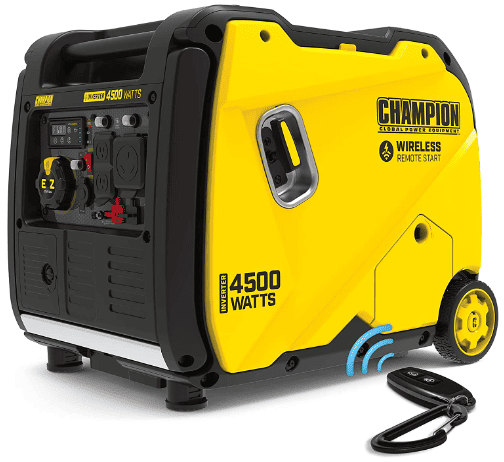
- Average Price: $900
- Peak/Rated Watts: 4500W/3500W
- Fuel Type: Gas
- Noise Level: 61 dB
- Run Time: Up to 14 Hours
- Weight: 97 lbs
2. Westinghouse iGen4500 Super Quiet Portable Inverter Generator
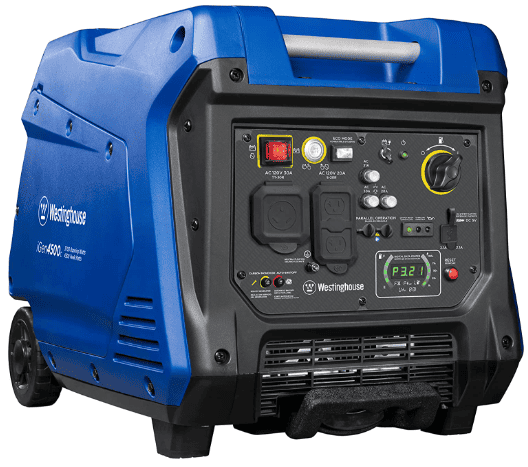
- Average Price: $900
- Peak/Rated Watts: 4500W/3700W
- Fuel Type: Gas
- Noise Level: 52 dB
- Run Time: Up to 18 Hours
- Weight: 93 lbs
3. Westinghouse WGen9500DF Dual Fuel Portable Generator
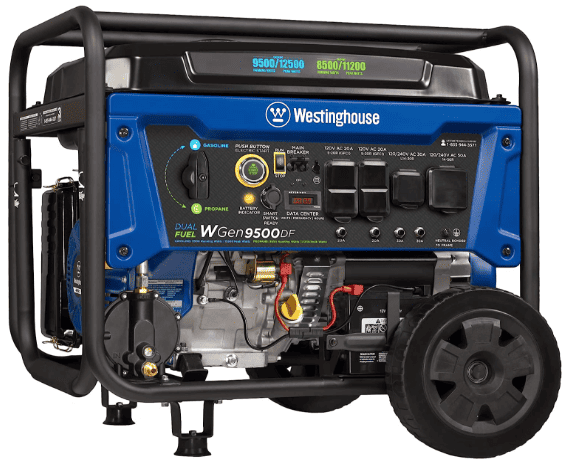
- Average Price: $1,000
- Peak/Rated Watts: 12500W/9500W (Gasoline)
- Fuel Type: Gas/Propane
- Noise Level: 74 dBA
- Run Time: Up to 12 Hours
- Weight: 210 lbs
To see even more portable travel trailer generator recommendations, check out our blog posts below.
- For 30 Amp Travel Trailers: 10 Best 30 Amp RV Generators for 2023 (Ranked/Reviewed)
- For 50 Amp Travel Trailers: 8 Best 50 Amp RV Generators for 2023 (Ranked & Reviewed)
How Long Can a Generator Run a Travel Trailer?
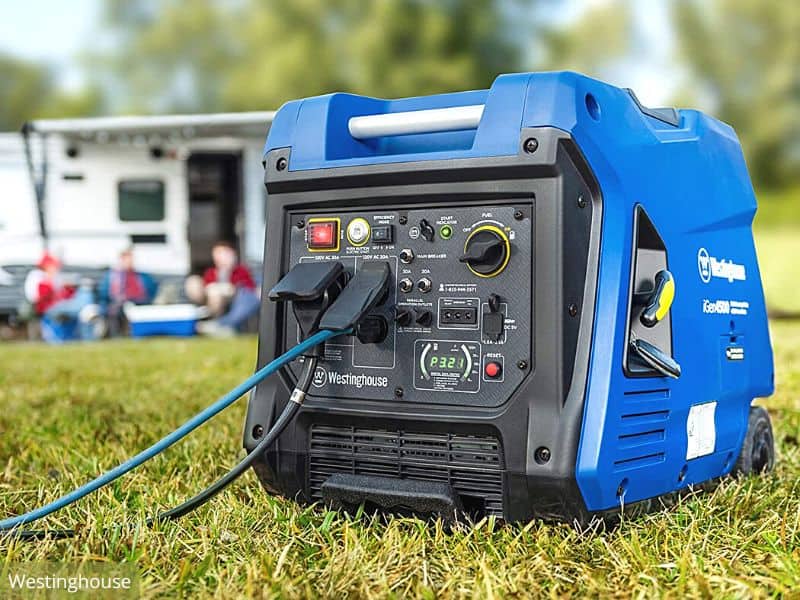
The runtime of a generator depends on many factors, including its fuel capacity and efficiency, as well as the power consumption of the camper.
On average though, most generators can run between 8 to 20 hours on a single tank of fuel.
However, this estimate can vary when you factor in the below variables:
- Generator Size and Efficiency: Larger generators with bigger fuel tanks naturally have longer runtimes, but they also tend to be less fuel-efficient. Conversely, smaller generators are more fuel-efficient but have smaller tanks, so they may need refueling more frequently.
- Type of Fuel: The type of fuel used can affect runtime. Generators can run on various fuels including gasoline, propane, or natural gas. Propane generators, for instance, often run longer on a single tank than gasoline generators, but propane produces less power per unit.
- Load on the Generator: The amount of power you’re drawing from the generator significantly impacts its runtime. Running high-consumption appliances like air conditioners, microwaves, and electric heaters will deplete fuel faster than when powering just lights and small electronics. The more appliances you use, and the more power they require, the shorter the generator’s runtime will be.
- Environmental Conditions: External factors like altitude and temperature can also influence generator runtime. Generators are less efficient in high altitudes or extremely hot or cold temperatures, which may reduce the runtime.
Recent Posts
47 RV Storage Ideas to Maximize Your Space for Compact Living
Camping and living in an RV is an incredible adventure, but it comes with its fair share of challenges, particularly around storage, due to the lack of space. Because of this, it's a must to make...
Are you looking to give your RV a cozy, rustic makeover? If so, farmhouse RV decor is the perfect style to transform your camper into a warm and inviting home on wheels. In this blog post, I'll...

